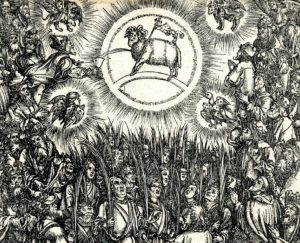Words on the Word
All Saints
Revelation 7:2-4, 9-14: A great throng, with palm branches.
1 John 3:1-3: What we are to be has not yet been revealed.
Matthew 5:1-12a: Blessed are the pure in heart, for they shall see God.
We keep the feast of All saints with our eyes fixed on the vast throng vividly described by John — whiterobed, waving branches, harmoniously singing. But we might ask: What is holiness? The English word ‘holy’ has grown, through the Old English hālig, from a Germanic root traceable to the eight century. The German adjective ‘heilig’ has remained unchanged till now, so seems familiar. But do we reflect on the sense it contains?
To be ‘heilig’ is, etymologically speaking, to bring or carry ‘Heil’, that is, haleness — we can easily see where this English word comes from. Holiness, then, is a state of being healthy and whole. This sense has a clear theological foundation. A holy woman or man is one who by grace has overcome sin; and sin is sickness, first and foremost, an inherited handicap no natural remedy can fix, that only God’s power is capable of healing.
To recover from sin, to get well, is to pass from a state of fragmentation, in which I’m torn in all directions by different tendencies and lusts within, to a state of integrity in which all vital energy, all desire points towards the same, divine finality.
When the Lord bids us, ‘Be perfect’, this is what he points towards. In the commandment, a promise is implicit: you can become healed and whole.
At this point, though, we must be vigilant. Health and wholeness are such alluring goods that we easily conceive of them as goals in themselves. We define them subjectively. Who better than I can know what I need to be healed? Especially now, when the internet readily confirms my suppositions, and I can turn up at the doctor’s with both my diagnosis and my prescription ready-made. My notion of my needs: this is the supreme criterium we live by, a lot of the time.
This is a powerful trend in modern Western society, a trend that causes the very notion of ‘society’ to disintegrate. For what in fact keeps us together? As Christians, we must be conscious that the wholeness and healing we seek are of a different kind, unifying.
Thank God the liturgy reminds us of this. A climactic moment in each celebration of Mass is our jubilant participation in the praise sung by the celestial host: ‘Holy, holy, holy is the Lord, God of hosts.’ God alone is holy in and of himself. We human beings are made holy in so far as we participate, through Christ, in divine life. He must show us what health and wholeness consist in: indeed, the way to holiness presupposes readiness to abandon ourselves to him entirely, even when this involves taking leave of our cherished notions of what constitutes our need.
Our outlook is so limited! We are like ants who think of our anthill as the world. Holiness, meanwhile, represents something audacious and divinely excessive. To become holy is to see the world, myself, and other people as God sees them. This is a risky enterprise; but it is wonderful.
Let us pray for courage freely to follow the call to holiness, encouraged by the cloud of witnesses surrounding us.

